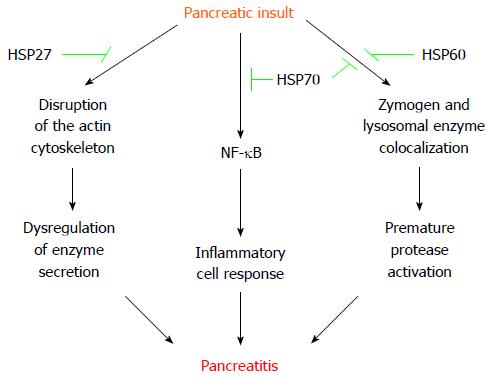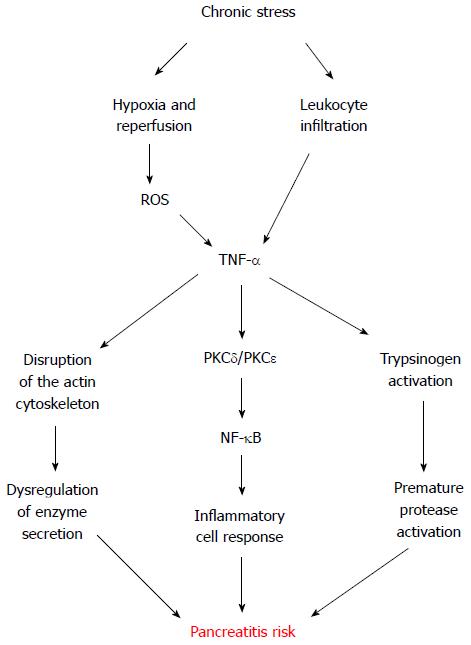Copyright
©2014 Baishideng Publishing Group Inc.
World J Gastroenterol. May 21, 2014; 20(19): 5801-5807
Published online May 21, 2014. doi: 10.3748/wjg.v20.i19.5801
Published online May 21, 2014. doi: 10.3748/wjg.v20.i19.5801
Figure 1 Hypothetical mechanisms underlying prior-acute-short-stress protects against pancreatitis.
Pancreatic insults may provoke dysregulation of enzyme secretion, premature protease activation and inflammatory acinar response, which result in the development of pancreatitis. Different stressors such as hyperthermia, hypothermia, hypoxia, energy depletion and chemicals, can induce pancreatic heat shock proteins (HSP) by a prior-acute-short-stress exposition. Distinct HSP avoid the disruption of the actin cytoskeleton, zymogen/lysosomal enzyme colocalization and activation of the pro-inflammatory nuclear factor-kappa beta (NF-κB) caused by the pancreatic insult. These HSP-mediated effects seem responsible for the protection against pancreatitis. The specific pathway inhibited by each HSP is depicted in green.
Figure 2 Hypothetical mechanisms involved in chronic stress sensitizes to pancreatitis.
Chronic stress compromises the exocrine pancreas by generating ischaemia and reperfusion processes, as well as attracting leukocytes to the pancreatic parenchyma. Ischaemia and reperfusion induce hypoxia and reoxygenation conditions that generate the intrapancreatic reactive oxygen species (ROS) responsible for acinar tumor necrosis factor-alpha (TNF-α) production. TNF-α released from both pancreatic acinar cells and leukocyte infiltrate, impact on pancreatic acinar cells producing disruption of the actin cytoskeleton (redistribution from apical to basolateral membrane), a protein kinase C delta (PKCδ)- and PKC epsilon (PKCε)-mediated activation of the transcription factor nuclear factor-kappa beta (NF-κB), and an increase in levels of active trypsin. Dysregulation of enzyme secretion, induction of inflammatory acinar response and premature intra-acinar protease activation associated to these pathological pathways sensitize the exocrine pancreas to pancreatic insults and increase the risk to develop pancreatitis.
- Citation: Binker MG, Cosen-Binker LI. Acute pancreatitis: The stress factor. World J Gastroenterol 2014; 20(19): 5801-5807
- URL: https://www.wjgnet.com/1007-9327/full/v20/i19/5801.htm
- DOI: https://dx.doi.org/10.3748/wjg.v20.i19.5801










